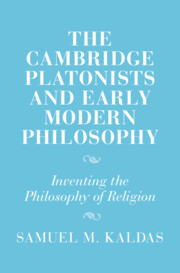Book contents
- The Cambridge Platonists and Early Modern Philosophy
- Cambridge Studies in Religion and Platonism
- The Cambridge Platonists and Early Modern Philosophy
- Copyright page
- Dedication
- Contents
- Acknowledgements
- Note on the Text
- Abbreviations
- Introduction: The Cambridge Platonists and Philosophy of Religion
- Part I The Origins of Cambridge Platonism
- Part II Rival Conceptions of God and Goodness:
- Part III The Religious Epistemology of the Cambridge Platonists
- 8 Reason and the Mind of God:
- 9 Deification as Spiritual Sensation:
- 10 Liberty, Violence and Practical Reason:
- Conclusion: The Cambridge Platonists as Early Modern Christian Platonists
- References
- Index
10 - Liberty, Violence and Practical Reason:
Moral Obligation and the Law of Love
from Part III - The Religious Epistemology of the Cambridge Platonists
Published online by Cambridge University Press: 09 May 2024
- The Cambridge Platonists and Early Modern Philosophy
- Cambridge Studies in Religion and Platonism
- The Cambridge Platonists and Early Modern Philosophy
- Copyright page
- Dedication
- Contents
- Acknowledgements
- Note on the Text
- Abbreviations
- Introduction: The Cambridge Platonists and Philosophy of Religion
- Part I The Origins of Cambridge Platonism
- Part II Rival Conceptions of God and Goodness:
- Part III The Religious Epistemology of the Cambridge Platonists
- 8 Reason and the Mind of God:
- 9 Deification as Spiritual Sensation:
- 10 Liberty, Violence and Practical Reason:
- Conclusion: The Cambridge Platonists as Early Modern Christian Platonists
- References
- Index
Summary
The Cambridge Platonists’ philosophy of religion might be summed up as a tension between their commitment to the fixed nature of reason and goodness on the one hand and a commitment to freedom and distaste for all forms of tyranny and imposition on the other. This last chapter contends that the Cambridge Platonists not only acknowledge this tension, but embrace it, revelling in the paradoxical way that absolute fixedness and absolute freedom come together at the highest levels of being. This is made possible by what Stephen Darwall (writing specifically of Cudworth) has identified as an early theory of ‘practical reason’. This Platonic theory of practical reason draws together all the elements of the Cambridge Platonists’ outlook considered in earlier chapters – moral realism, divine communicative intent, and participatory epistemology, illustrating the extent to which this Platonic outlook binds together not only the thought of Whichcote, More, Cudworth and Smith but also runs through each of their views on different philosophical topics such as obligation, freedom and pedagogy.
- Type
- Chapter
- Information
- The Cambridge Platonists and Early Modern PhilosophyInventing the Philosophy of Religion, pp. 269 - 285Publisher: Cambridge University PressPrint publication year: 2024



